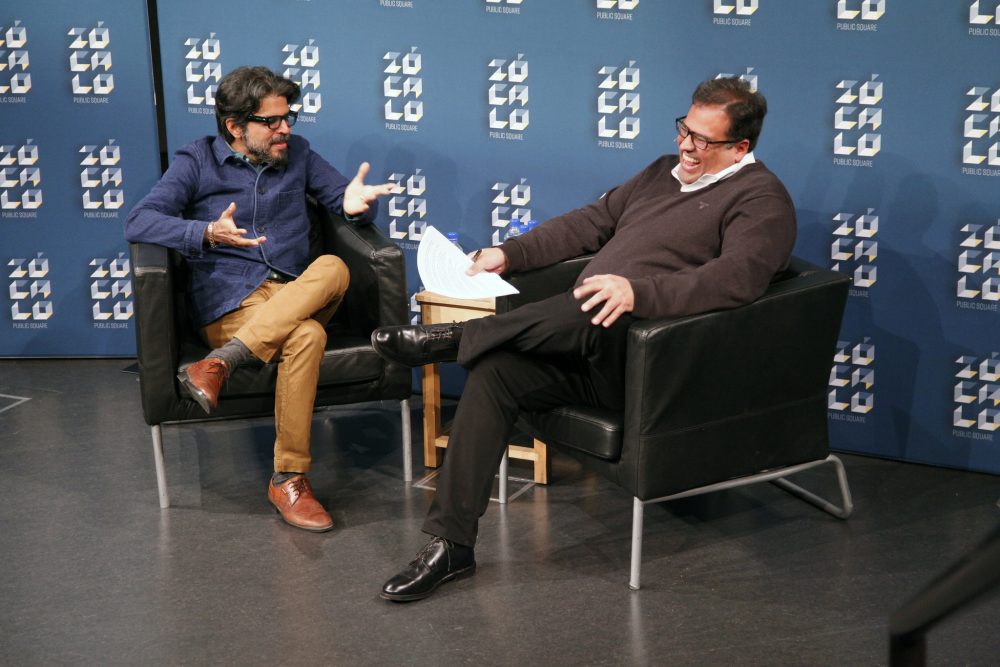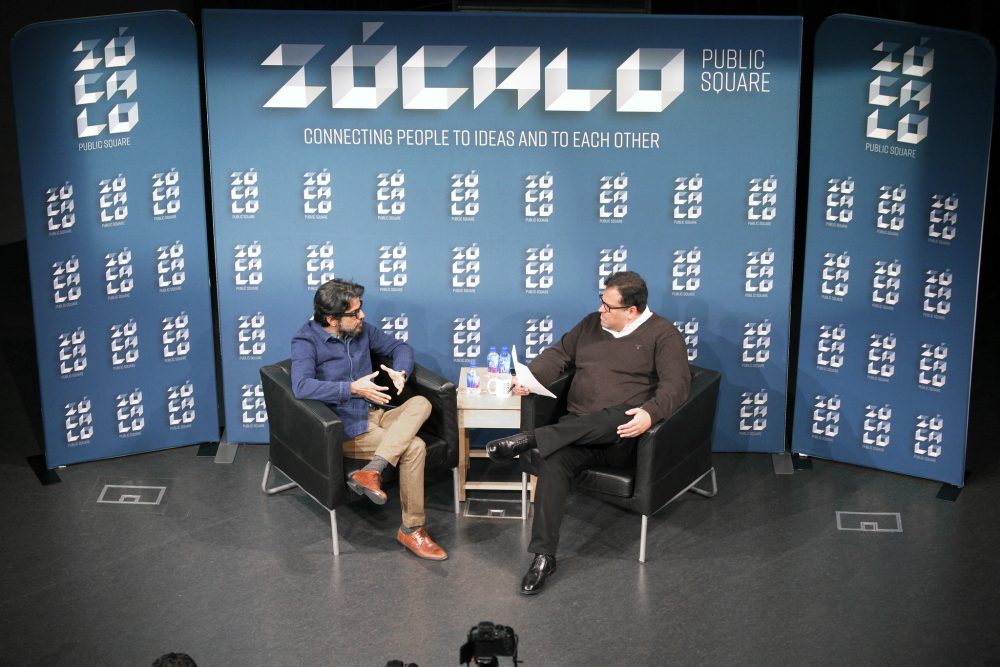
The writer Pankaj Mishra has a name for an era in which frustrated young men commit savage acts of violence, society is starkly split into economic winners and losers, and despotic leaders exploit the public’s bitter resentments. He calls it the “Age of Anger,” which is also the title of his 2017 book, subtitled “A History of the Present.”
But that history begins long before our own benighted century. A pervasive and alarming sense of uprootedness and spiritual dislocation began brewing in the late 18th century in Europe, Mishra believes, and has mutated into “a global, universal experience.”
The resulting “contradictions are felt most painfully within one’s own soul, within one’s divided self,” Mishra said, setting the tone for a Zócalo event titled “Why Is the Modern World So Angry?” The fantastical promises of Western neo-liberal democracy, that all humanity could attain lives of prosperity and “enlightenment,” have proven “unfulfillable,” Mishra said. That has left millions of people feeling alienated not only from society but from themselves; their sense of disillusionment and fury has deepened since the fall of the Berlin Wall, leading to what Mishra calls a global “manic tribalism.”
How did Mishra come to this conclusion? Gregory Rodriguez, founder and editor-in-chief of Zócalo Public Square and the evening’s moderator, launched the conversation by asking Mishra about his self-characterization as a “stepchild of the West.” How did growing up in rural India during a period of intense and rapid change help shape Mishra’s ideas about a planetary maelstrom that has produced ISIS guerrillas, Russian cyber-hackers, and neo-Nazi skinheads wielding tiki torches in Charlottesville?
Mishra said that “practically everything I’ve written”—from histories to travel essays—has come out of his knowledge of friends and acquaintances who left college and plunged into a world of personal frustrations and constricted professional opportunities.
“I was really writing about the kind of young men I have grown up with, and you can find in large parts of Asia and Africa,” he said, “people uprooted from their traditional habitats who have been brought out of traditional village life.”
Their frustration and rage, widely shared in many parts of the world, hasn’t been reflected in popular media, said Mishra. Instead, we’re accustomed to seeing images of the “slumdog millionaire,” a poor parochial who somehow manages to realize the American Dream.
“My instinct has been to push back against this boosterish narrative,” said Mishra.
The narrative of “ambition, aspiration, and disappointment” is a new one. Millions of Indians in Mishra’s parents’ generation underwent the trauma of having to migrate from their ancestral villages in search of work, and reinvent themselves as urbanites. Yet often they were able to preserve some traditional aspects of their prior small-town lives without having to fully embrace modernity.
“My generation had to make a cleaner break,” Mishra said. He and his friends knew that learning English, and acquiring a knowledge of Western culture, was an essential “passport” for any kind of success in the modern world—for becoming what the West conceives of as a modern individual. But that process of self-reinvention comes at an excruciating psychological and spiritual price for many people in Asia, Africa, Latin America, and other places that for centuries have been scrambling to catch up materially with the United States and Europe.
Picking up on that point, Rodriguez asked whether the tone of Mishra’s 2004 book, An End to Suffering: The Buddha In the World, hadn’t posited a more hopeful, and healing message. How had Mishra’s thinking evolved between that book and Age of Anger?
Mishra jokingly cited Proust’s observation that everything that can be said has already been said, since nobody listens. “Perhaps the change of tone may be put down to the fact that I just got pissed off because nobody was listening.”
“You were younger, you seemed happy!” Rodriguez told him.
“I’m very happy today!” Mishra shot back. More seriously, he added, “There is something therapeutic about understanding. That has certainly motivated me to get to the bottom of things.” When he arrives at understanding, he said, it does feel somewhat “redemptive.”
Asked about his feelings toward the United States—and, in particular, the man serving in the White House—Mishra replied that he has many friends and colleagues here, feels very connected to American intellectual life, and sees America as “the most radical experiment in human history.”
But as someone who comes from India, and “who also has felt the sharp edge of American imperial power, it’s difficult not to be critical, and sometimes stridently, of American power in that part of the world.” He views the American faith in boundless expansion, and the inevitability of progress, with a sense of foreboding.
“I feel like we’ve come to the end of that experiment, and a new American experiment has to begin,” he said.
Some audience members followed up on this theme during the question-and-answer period. One asked about the relationship of the “age of anger” to the decline of U.S. power. Mishra said that what the United States is facing, and sometimes struggling with, is that many countries have been experiencing rising upward mobility at a time when U.S. growth has been relatively decelerating, and many Americans are watching their opportunities shrink relative to those of previous generations.
Another audience member asked what Mishra thinks the world should be like in the future. Mishra replied that he could only make such prescriptions for the limited locality in which he grew up. “The world is something too abstract for me,” he said. “Prescribing what the world should look like might be repeating the same error that has brought us to this point.”
Rodriguez also pressed Mishra about how the future world might reassemble itself, once the age of anger burns itself out. Could “some new broad sense of transcendence” emerge? What sort of structures would we need to foster and support a good society?
“I think we’ve invested far too much in utopias, in the idea that we’ve arrived at the end of history,” Mishra concluded. Such ideas are a cover for preserving the rights and privileges of a very small minority, he added.
As a writer and a native of rural India who now makes his home in cosmopolitan London, Mishra is comfortable at least knowing that his own future will remain rooted in a place in-between.
“Feeling too much at home in the world,” Mishra summed up, “is a recipe for complacency and intellectual laziness.”





Send A Letter To the Editors